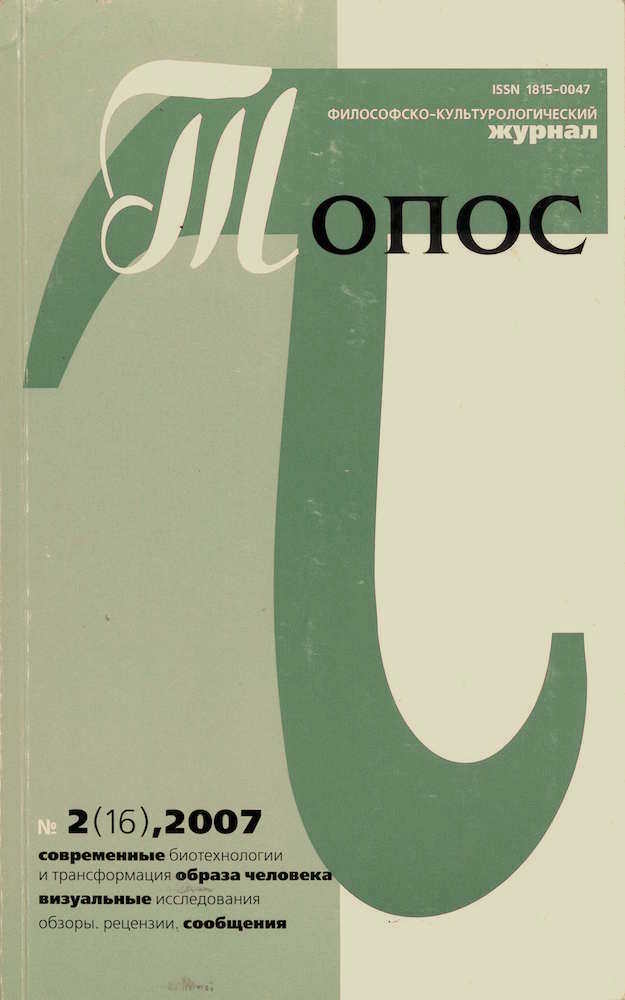Phenomenology of Vision. Cinematographic Experience
Article
Abstract
[In Russian]
Does our perception of reality change after the invention of
cinema? Does cinematography bring something about our percep- cinematography bring something about our percep- cinematography bring something about our perception which destroys habitual and fast learned conventions of realism?
One of the first theoreticians in cinematography, Jean Epstein stated
that «cinema gives birth to the reality of the second order – the
reality of camera». It is significant that the reality born by camera
is more convincing than the first, non-cinematographic one.
Cinematography provokes the vision, gives a logical end to the
process which has begun in the 20th century painting and brings us
to the conditions of perception as such. According to the theoreticians of early cinematography, cinema screen bears not only sense
of things but also the mechanism which generates this sense.
Despite seemingly unsophisticated reflections upon the cinema
language, the first theoreticians point to one of the essential charac- , the first theoreticians point to one of the essential charac- first theoreticians point to one of the essential charac- theoreticians point to one of the essential charac- theoreticians point to one of the essential charac- point to one of the essential charac- point to one of the essential charac- to one of the essential charac- to one of the essential charac- one of the essential charac- one of the essential charac- of the essential charac- of the essential charac- the essential charac- the essential charac- essential charac- essential charac- charac- characteristics of cinematography: following Tsivian’s term, it is a passing
ahead reception in cinema. The art of cinema was forced to invent
its language of expression in working order, and, that is why, usu- language of expression in working order, and, that is why, usu- language of expression in working order, and, that is why, usu- of expression in working order, and, that is why, usu- of expression in working order, and, that is why, usu- expression in working order, and, that is why, usu- expression in working order, and, that is why, usu- in working order, and, that is why, usu- in working order, and, that is why, usu- working order, and, that is why, usu- working order, and, that is why, usu- order, and, that is why, usu- order, and, that is why, usu- , and, that is why, usu- and, that is why, usu- , that is why, usu- that is why, usu- is why, usu- is why, usu- why, usu- why, usually any film contains all paradigms of the cinema language and
rules of its perception at the moment of its creation. Cinematography is a kind of art where the means/process itself of representa- is a kind of art where the means/process itself of representa- is a kind of art where the means/process itself of representa- a kind of art where the means/process itself of representa- a kind of art where the means/process itself of representa- kind of art where the means/process itself of representa- kind of art where the means/process itself of representa- of art where the means/process itself of representa- of art where the means/process itself of representa- art where the means/process itself of representa- art where the means/process itself of representa- the means/process itself of representa- means/process itself of representation becomes a main subject. Drawing an analogy with theatre one
can assert that cinematography is preoccupied not only with the
performance but with representation itself and with arrangements
of cinematographic stage which organise cinema action.
The surprising peculiarity of cinematography is that it brings
us to the basis of perception. However, this happens not because of
the coincidence of cinematographic situation and natural perception, but because the very possibility of this naturalness is problematised; the reality of the second order is more convincing than
that of the first one – non-cinematographic.
Downloads
This journal allows the author(s) to hold the copyright without restrictions. Topos Journal uses CC BY-NC-ND 4.0 license (license URL: http://creativecommons.org/licenses/by-nc-nd/4.0).



